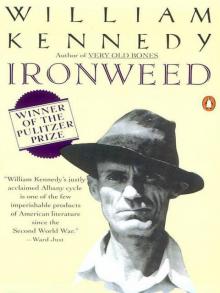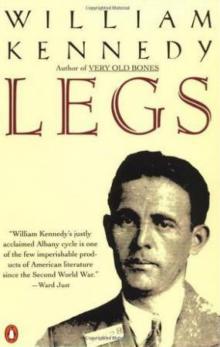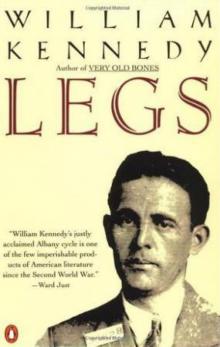- Home
- William Kennedy
The Ink Truck Page 21
The Ink Truck Read online
Page 21
Jarvis considered his future, should the strike truly be over. He could not go back to the company, having once sent out feelers and discovered that he wasn’t wanted, not even as a defector. Popkin said there were no openings in the superstructure of the Guild, but he promised to get Jarvis a job. Popkin sounded sincere, but Jarvis grew pervasively sad. He could weep for the absence of justice in life. A man who worked as hard as he’d worked. And when he thought of the party he thought of having to face Bailey. And Rosenthal. And Irma. Not to mention Stanley, whom he feared, and Popkin, who merely by being neat and organized intimidated Jarvis. Popkin even scared Jarvis’ dog.
Deek’s nurse sat by his bed, holding his hand away from her leg, which it kept stroking at the smooth underside of her white-stockinged knee. Had he not had a probable concussion, had his illness been more external, less vital, she would have been less restrained, for the patient was virile and attractive. To pass the time she played hand games with Deek and told him hospital stories. Her first story was about the man who bled to death on the operating table. Then she told him about the man with pus in his eye and how he’d waited too long to treat it and by that time there was no point in operating. Also she mentioned the night everybody forgot to give a patient anesthesia when he was operated on for throat cancer. “We all talked about it,” the nurse said.
The television commentator who had interviewed Bailey completed his broadcast on the show-cause order that had been handed to the pickets in front of the company. The order cited each picket by name and ordered him to appear in Supreme Court the next morning to show cause why he should not be enjoined from picketing in light of the agreement between company and Guild which ended all known disputes the company had with any formally organized or ad hoc group known to exist in the city, state or nation. The pickets were told the order would be dropped should they disperse, which they did. And when the commentator left the studio to cover the strike-settling party at Stanley’s house, he felt his workday was at an end and that what happened on this festive night would happen for good or ill and not as news; for, after all, the central figure in the strike was Bailey, who was probably certifiably mad. And Bailey’s madness had been neutralized, his news story consummated, and further coverage better left to historians or Sunday-supplement specialists.
Miss Blue, alone on the bed, felt the fire being kindled deep in her pubic hearth. Less than half an hour had passed since last it had been smothered. She was weary of smothering it herself. She tried to put the fire out of her mind. She thought of her mother. She always got her letters back from her mother, unopened. And her birthday gift to her mother, a year’s supply of depilatory, had been refused only yesterday. So earlier in the day she had battered down her pride and called her mother on the phone. “You don’t do anything right anymore,” her mother told her. “You don’t seem to have any feelings, carrying on with that old man, making a spectacle of yourself.” Downstairs the guests were beginning to arrive. Miss Blue’s hand moved toward her natural center.
Grace Bailey was met at the railroad station by a company guard who drove Stanley’s private limousine. She had come back because Stanley said he would pay her two hundred dollars if she did, and had wired her fifty as a token of good faith. But also she leaped at the chance to show Bailey that she had finally caught his stupid pooka. She held a small, plastic-topped animal carrier on her lap as the car moved through traffic.
Three junior executives from the advertising, circulation and business departments, with their wives, were the first to arrive. Stanley embraced all the women and patted them on the lower portion of the small of their backs. He shook hands with one of the men and told him his fly was open, “which augurs well for our party,” Stanley added. He then hugged the other two juniors simultaneously, one arm around the waist of each. The affection embarrassed the young men, though they did not protest, for Stanley was their senior and it would have been unseemly to even hint that he could not do precisely as he chose. It was their first party at Stanley’s house.
Irma arrived breathless, fearing the worst. She brushed past the guard at the door and walked to the living room, where Stanley stood amid the gathering throng: the young executives and scabs, Popkin at Grace’s elbow, Smith by himself in a Louis Quinze chaise lounge. Irma, with cheeks reddened by cold and panic, still in her coat and hat, barked at Stanley: “Is he here?”
“Haven’t you been able to find him?” Stanley said quietly.
“Is he here or isn’t he?”
“You’re very upset.”
“Never mind me. Where’s Bailey?”
“The last I heard he was upstairs sleeping.”
“Oh, Jesus,” she said, wheezing. The frenzy left her. She sat on a sofa and took off her hat. When she eventually looked around the room at the people, she was instantly bored. She was cooling but emptying. Now that Bailey was found she could think again of her own condition. The strike was over, all purpose gone from her days. She could devote herself to Bailey, and would, gladly, lovingly. But what would Bailey do? More than ever before, his purpose was voided. When she heard about his attack on the ink truck she understood his hunger strike. Did he understand it himself? She wasn’t sure. He was so honest with himself that he thought secondary motives were as golden as primary. That was why he brought all his strength to whatever he did. Oh, Bailey, you dumb bunny. Not every venture deserves your whole bleeding heart.
Irma began to weep for half a dozen reasons.
Bailey knew the strike was not quite over, that Stanley had something in mind besides magnanimity and sociality. Stanley possessed a heightened sense of irony and it was this that Bailey expected to see him exercise by means of the party. Having endured an agonizing week, Bailey had small concern for ironic development. Irony was a fetching but effete weapon. Given the nature of most enemies, Bailey felt irony suffered by comparison to the chain mace.
Stanley knocked and entered the room where his guards had carried the unconscious Bailey.
“Time to get up and join the party,” Stanley said.
Bailey only looked at him.
“Are you able to sit up and take nourishment, or has your stomach shriveled?”
“I already ate four knuckles and a billy club.”
“Yes, I regret that. But then the guards couldn’t leave you there under that truck, could they? You do bring out the worst in my guards.”
“You’ve got your cordial manner on. Is this party for real?”
“It’s been in preparation all week.”
“You won’t club me when I step out the door?”
“Tut-tut, Bailey. Do you take me for a barbarian? To do that in my own home?”
“I wouldn’t be surprised if your home turned out to be a Nazi rocket base.”
“Crude skeptics, all you newspaper people. Come along now, the lady wants to see you. Your friend Irma.”
“Irma.”
Stanley smiled like a congenial old grandpap. Bailey, comfortable in bed for the first time in a week, warm for the first time in a week, tried to resist being reciprocally pleasant. But strength was lacking. And need. The strike was lost, the hunger strike over, the ink truck assaulted and its contents indelibly on his hands. What jot or tittle might a joust with Stanley add to the events? He breathed easily and returned Stanley’s smile.
“Send her up.”
Stanley backed out, gently closed the door.
Irma fell on the bed, threw her arm over Bailey’s chest and kissed him with a wet face.
“I always think you’re dead,” she said.
“And I never am.”
“Isn’t that nice? And I’m not dead either.”
“We’re both not dead.”
“I don’t know why you’re not dead, the things you do.”
“The timid mongoose will never liquefy the cobra.”
“Never mind with the wisdom.”
“Actions improve on speech anyway, wouldn’t you say?”
“Yes. I would.
Yes. Yes now, and oh! That’s a lovely action now. Oh yes, oh my. Lovely. Oh!”
By the time Bailey and Irma came down the stairs, all the guests had arrived. And all noted Bailey’s entrance. Rosenthal thought he looked weakened, but still strong. Shirley Rosenthal resented all eyes being turned toward him, always him. Stanley smiled, anticipating the surprises he had in store for Bailey and others. Clubber Reilly appraised Bailey’s stature in light of Morelli’s attack plan, decided it was not worth all that trouble. Morelli’s anger intensified at the sight of Bailey. Miss Bohen wondered how such a trade-union clod like Bailey ever got so much attention. Deek studied the way Bailey carried himself. The scab copy editors grew nervous: One inhaled deeply, one lit a cigarette and one cracked his knuckles. Their wives, seeing Bailey for the first time, picked him apart with their eyes to discover what it was that made their husbands resent him so fiercely. Popkin debated whether to shake hands with Bailey or ignore him. Smith could not understand why Stanley invited the evil maniac to dinner. Stephanie smiled at Bailey, trying to remember who he was. Captain Melvin, having heard of Bailey’s hunger strike only in the past fifteen minutes, looked at his nephew with new puzzlement, unable to say why he liked him better than he had ever liked any of his relatives. Jarvis slithered alongside the grandfather clock and peered around it at Bailey through narrowed eyes that would not have to admit that they met his glance, should he look Jarvis’ way. Deek’s nurse, conditioned to admire Bailey after listening to Deek praise him, found his looks odd but unexceptional, and a little peaked; certainly not what a hero should look like. The TV commentator sensed the tension that Bailey brought into the room and regretted not having his cameraman with him, just in case Bailey’s madness should erupt anew. Miss Blue was the first to touch Bailey, shake his hand. Grace Bailey glanced from Bailey to the animal carrier in the corner, fought the impulse to run to it, shove it up in front of his face and laugh until she busted. The three junior executives looked upon Bailey with contempt: One snorted, one sneered and snuffed out a cigarette, and one, after glimpsing Bailey, immediately cast his glance elsewhere lest he somehow be thought to be interested in what Bailey said or did. Their wives, seeing Bailey for the first time, picked him apart with their eyes to discover what it was that made their husbands express such haughty contempt for him. Irma, one step behind Bailey, saw all the eyes upon him, felt like his queen.
Two waiters moved through the crowd with trays of martinis and highballs. A third waiter took orders from those who wanted neither. The guests spilled out of the main parlor into the huge library with its great oak tables, its mullioned windows, its walls lined with the Britannica, with law books and what seemed to be the complete works of every literary figure who wrote books in sets suitable for leather binding. The room had a mustiness about it, an unused eeriness that Bailey sensed despite the prevailing gaiety of the gathering. Nothing on the tables seemed meant for use, or even human touch. Vases were without flowers, magazine racks without magazines. There were no ashtrays.
“Your house has all the warmth of a museum,” Bailey told Stanley.
“It’s the way Mommy wanted it. I inherited her money on condition everything stay just as it was when she was alive. She felt if I started changing the furniture around that pretty soon I’d buy new stuff. And then I’d forget the things I associate with the old stuff. And her. An inspector comes in every week to measure the distance between chairs and tables. She had the house diagrammed, piece by piece, before she died.”
“Won’t all the people going around touching things jeopardize your inheritance?”
“I’ll straighten up tomorrow.”
“You could break a screwy will like that.”
“My mother understood love, Bailey. You think I’d go against her last wish?”
“No, I suppose not. Not you.”
Irma pulled Bailey away and through the crowd.
“This is obscene, us being here like this, behaving like nothing’s happened. Instead of being so damn pleasant, I ought to spit in his eye. And his mother’s too if I knew where they buried her.”
“Let me remind you,” Bailey said. “The cheetah plays Ping-Pong while the mockingbird challenges the clam.”
“I never thought of it that way,” Irma said.
“Yesterday,” a scab wife was saying, “I couldn’t get organized all day long. I was just as confused when I went home at night as I was when I got up in the morning. It’s a great feeling.”
“A cow fell on my cousin,” said a junior-executive wife, “and broke twenty-six of his bones, including his collar one.”
“Tonight,” said a scab editor, “we ran over a cat.”
“What did you say?” Captain Melvin asked.
“I said we ran over a cat.”
“Did you hurt it?”
“Squished the hell right out of it.”
“You sacrilegious rectum rat,” the captain said, “you’ll regret that foul deed.” He leaped on top of the scab and began to choke him. Morelli and Reilly pulled him off.
“Over at the bank,” a junior executive said, “they told me they found narcotics in the safe deposit boxes. About once a year they find a fetus.”
Miss Bohen edged through the crowd, finally reached Stanley and whispered in his ear: “I was unfaithful to you last night. I dreamed I was ravished by a boa constrictor who belonged to the union.” Stanley, without turning, surreptitiously rubbed Miss Bohen’s right leg, a stick.
Smith, growing drunk, cast a gesture that encompassed all the books in the library. “There aren’t any books in this room that are right,” he said. “That picture is wrong. And that one. And that chair. The world is dying. People are sick and rotten. Evil is taking over. Take a look at those plants.” Smith took off his shirt.
Grace Bailey broke through the crowd that encircled her, ran to the corner and grabbed the animal carrier. Holding it in front of Bailey, she yanked off its cloth cover and said only: “Hah!” Bailey stared at the carrier, looked inside it.
“What am I supposed to see?”
“You know what you see. Your goddamn pooka.”
Bailey looked again, carefully.
“That’s not my pooka,” he said.
Popkin, holding Shirley Rosenthal’s hand, told her how much he thought of her husband, how brave he was, how loyal.
The nurse felt Deek’s hand nearing a vital region. She was tempted to stand up from his lap and pull down her skirt, but she resisted the temptation. She told Deek the story of the man who had his mouth and chin removed.
Stephanie leaned forward slightly to give the TV commentator a better view. Clubber Reilly made a muscle for a scab wife. Fats Morelli saw Reilly in action, did the same for an executive wife.
“Hello,” Miss Blue said.
“Hello,” said Rosenthal.
Jarvis, alone under a bunch of Renoir flowers, wondered which conversation he should try to break into.
Stanley smiled, sensing all was well.
At dinner by candlelight a wave of servants brought endless amounts of food to the table, giving the guests multiple choice. Stanley inspected each dish and then like a train dispatcher, announced it by name: Alexandra Consommé, Caesar Salad, Oysters à la Rockefeller, Artichokes Knickerbocker, Asparagus à la Pompadour, Roast Capon Alexandre Dumas, Filet of Beef Garibaldi, Turkey Galantine à la Paderewski. “And especially for our hunger striker,” he said, “Irish colcannon, O’Brien potatoes, Mulligan hash.”
The heat in the room was unnatural. Stanley suggested loosening collars, necklines, taking off shirts. To put the guests at ease, he opened his own shirt down the front. Miss Blue doffed her blouse as people began to sweat perceptibly. A servant unveiled a sixteen-millimeter movie projector as Stanley explained: “A little diversion to help your digestion.” Then the servant projected a crude Popeye cartoon. Popeye, en route to woo Olive Oyl, finds her in bed with Wimpy. Disconsolate for a moment, he finally leaps in with them.
“Boop-boop,” said Miss Bl
ue as it ended. “Wasn’t that knobby?” She took off her skirt. The junior executive beside her took off his tie and shirt. Across the table his piqued wife, next to shirtless Morelli, took off her dress.
A second film was begun, the story of a burglary of a woman’s apartment. Two men in masks enter and terrorize the woman at gunpoint. One forces her to disrobe. They ogle her. She tries to charm them, succeeds. They take off their masks, then their trousers. Soon everyone is occupied, partly on, partly off the bed. The woman, who looks Latin, smiles at the camera to show how pleased she is that she was able to charm her intruders, then returns her face to the one who was using it.
Captain Melvin turned away from the film to see Miss Bohen stepping out of her dress. The sight stunned him. When she saw him watching she grabbed his hand.
“Holy piss jars,” he said as Miss Bohen flung herself onto his lap.
Other impromptu couples broke away from unfinished meals and began cavorting on sofas and overstuffed chairs. Shirley Rosenthal hit Smith with a wine bottle when he tried to handle her. Stephanie popped out of her blouse, and Jarvis, beside her, fell off his chair. Miss Blue, the first to be naked, her tattoos covered with flesh-colored makeup, turned on the phonograph and twirled about the room in waltz time.
Bailey had eaten nothing. The part of him that had fasted willingly wanted the fast to continue. The food looked and smelled succulent, delicious; temptation for the most discriminating gourmet. Bailey’s stomach rumbled as it hadn’t rumbled in weeks, juices roiling, the visual turning loose the visceral. Yet he could not make the leap into willful eating. He looked at Irma, at the Rosenthals, who were still at table along with an executive wife, and Stanley. Their eyes were all glazed with a contentment of the body, an obvious numbing of some control center of the brain. Bailey, clearheaded, felt removed from all possibility of abandonment to sensual pleasure. The reveling in food, he felt, was as orgiastic as the frolic on the sacrosanct furniture.

 Riding the Yellow Trolley Car: Selected Nonfiction
Riding the Yellow Trolley Car: Selected Nonfiction Changó's Beads and Two-Tone Shoes
Changó's Beads and Two-Tone Shoes Ironweed
Ironweed The Ink Truck
The Ink Truck Billy Phelan's Greatest Game
Billy Phelan's Greatest Game Legs
Legs Very Old Bones
Very Old Bones The Last Mission
The Last Mission The Flaming Corsage
The Flaming Corsage Roscoe
Roscoe Quinn's Book
Quinn's Book Ironweed (1984 Pulitzer Prize)
Ironweed (1984 Pulitzer Prize) Riding the Yellow Trolley Car
Riding the Yellow Trolley Car Legs - William Kennedy
Legs - William Kennedy